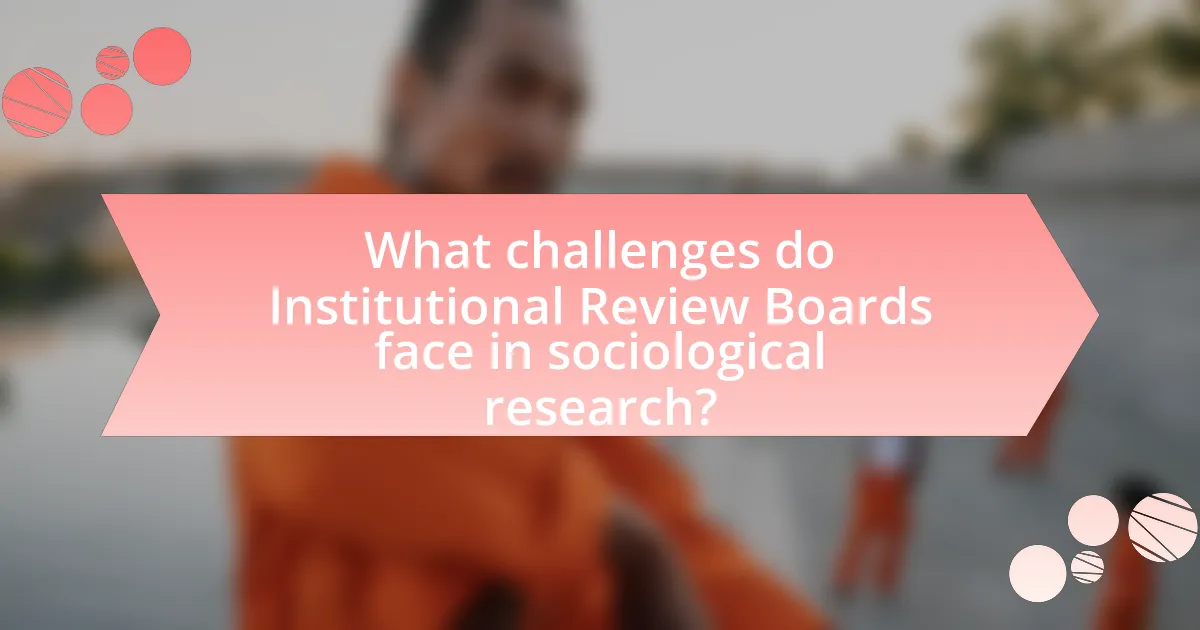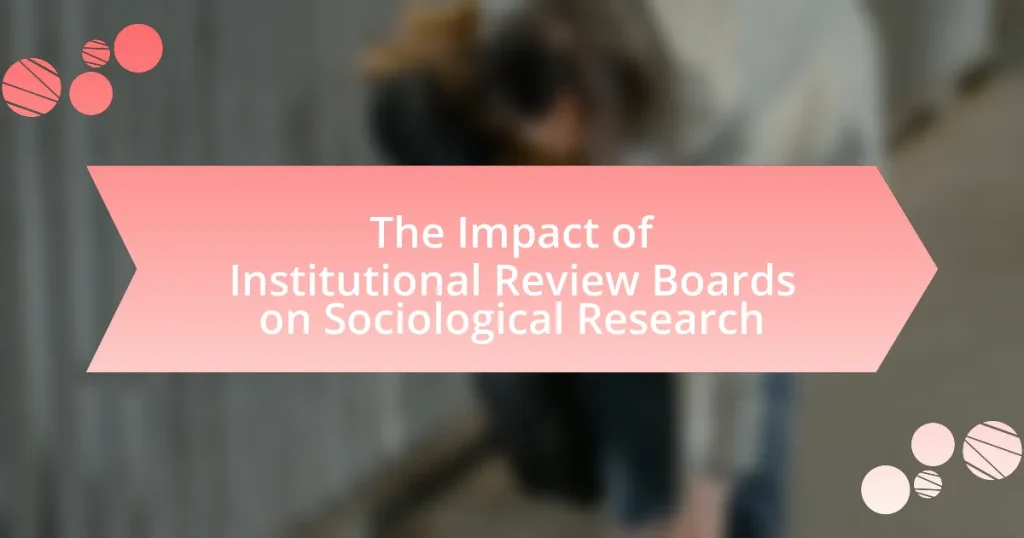Institutional Review Boards (IRBs) are essential committees that oversee research involving human subjects, ensuring ethical standards are upheld in sociological research. This article examines the role of IRBs in evaluating research proposals, assessing risks and benefits, and protecting participants’ rights and welfare. It discusses the key responsibilities of IRBs, the challenges they face, and their impact on research timelines and outcomes. Additionally, the article highlights emerging trends in IRB practices, including the integration of technology and community engagement, as well as best practices for researchers to facilitate effective communication and streamline the approval process.

What are Institutional Review Boards and their role in sociological research?
Institutional Review Boards (IRBs) are committees established to review and oversee research involving human subjects, ensuring ethical standards are met. Their role in sociological research is to evaluate research proposals for ethical considerations, such as informed consent, risk assessment, and the protection of participants’ rights and welfare. IRBs are mandated by federal regulations in the United States, specifically the Common Rule, which requires that any research funded by federal agencies undergoes IRB review. This oversight helps to maintain public trust in sociological research by safeguarding participants from potential harm and ensuring that studies adhere to ethical guidelines.
How do Institutional Review Boards function within research institutions?
Institutional Review Boards (IRBs) function within research institutions by reviewing research proposals to ensure ethical standards are met, particularly concerning the protection of human subjects. They assess the potential risks and benefits of research studies, ensuring compliance with federal regulations and institutional policies. IRBs consist of a diverse group of members, including scientists, ethicists, and community representatives, who evaluate the research’s ethical implications and the informed consent process. This oversight is crucial for maintaining public trust in research practices and safeguarding participants’ rights and welfare.
What are the key responsibilities of Institutional Review Boards?
Institutional Review Boards (IRBs) are primarily responsible for ensuring the ethical conduct of research involving human subjects. Their key responsibilities include reviewing research proposals to assess risks and benefits, ensuring informed consent processes are adequate, and monitoring ongoing research for compliance with ethical standards. According to the U.S. Department of Health and Human Services, IRBs must evaluate the potential risks to participants against the anticipated benefits of the research, ensuring that the rights and welfare of participants are protected throughout the study.
How do Institutional Review Boards ensure ethical standards in research?
Institutional Review Boards (IRBs) ensure ethical standards in research by reviewing research proposals to assess risks and benefits, ensuring informed consent, and protecting the rights of participants. They evaluate the ethical implications of research methodologies, ensuring compliance with federal regulations such as the Common Rule, which mandates that research involving human subjects must minimize risks and maximize potential benefits. IRBs also require researchers to provide clear information about the study’s purpose, procedures, risks, and benefits, thereby safeguarding participants’ autonomy and welfare. This systematic review process is crucial for maintaining ethical integrity in sociological research and fostering public trust in research practices.
Why are Institutional Review Boards essential for sociological research?
Institutional Review Boards (IRBs) are essential for sociological research because they ensure the ethical treatment of research participants. By reviewing research proposals, IRBs assess potential risks and benefits, safeguarding participants’ rights and welfare. This oversight is crucial in sociological studies, where sensitive data and vulnerable populations are often involved. For instance, the Belmont Report outlines ethical principles that guide IRB evaluations, emphasizing respect for persons, beneficence, and justice. These principles help maintain public trust in sociological research, ensuring that studies are conducted responsibly and ethically.
What risks do Institutional Review Boards mitigate in sociological studies?
Institutional Review Boards (IRBs) mitigate several risks in sociological studies, primarily focusing on ethical concerns, participant safety, and data integrity. They ensure that research involving human subjects adheres to ethical standards, protecting participants from harm, coercion, and exploitation. For instance, IRBs review research proposals to assess the risk of psychological distress, privacy violations, and informed consent issues. By enforcing regulations such as the Belmont Report principles—respect for persons, beneficence, and justice—IRBs help maintain ethical research practices. This oversight is crucial in sociological studies, where sensitive topics may lead to emotional or social repercussions for participants.
How do Institutional Review Boards protect research participants?
Institutional Review Boards (IRBs) protect research participants by ensuring that studies adhere to ethical standards and regulations. They review research proposals to assess risks, benefits, and the informed consent process, ensuring that participants are fully aware of their rights and the nature of the research. According to the U.S. Department of Health & Human Services, IRBs are mandated to evaluate the ethical implications of research involving human subjects, which includes monitoring ongoing studies to safeguard participant welfare. This oversight helps prevent harm and promotes ethical treatment, thereby enhancing the integrity of sociological research.

What challenges do Institutional Review Boards face in sociological research?
Institutional Review Boards (IRBs) face several challenges in sociological research, primarily related to balancing ethical oversight with the need for academic freedom. One significant challenge is the interpretation of ethical guidelines, which can vary widely among IRBs, leading to inconsistent reviews and approvals. For instance, sociological research often involves sensitive topics that require nuanced ethical considerations, yet IRBs may apply rigid standards that do not account for the complexities of social research. Additionally, IRBs must navigate the tension between protecting participants and allowing researchers to explore important social issues, which can result in delays or rejections of research proposals. These challenges are compounded by the increasing complexity of sociological studies that incorporate diverse methodologies and populations, making it difficult for IRBs to maintain a clear and consistent review process.
How do Institutional Review Boards balance ethical considerations and research needs?
Institutional Review Boards (IRBs) balance ethical considerations and research needs by evaluating research proposals to ensure participant safety and ethical integrity while allowing valuable research to proceed. They assess risks versus benefits, ensuring that the potential benefits of research justify any risks to participants, as mandated by federal regulations such as the Common Rule. This regulatory framework requires IRBs to review informed consent processes, confidentiality measures, and the overall ethical implications of the research. By adhering to these guidelines, IRBs facilitate research that contributes to scientific knowledge while protecting human subjects, thus maintaining a critical equilibrium between ethical standards and the advancement of research.
What conflicts can arise between researchers and Institutional Review Boards?
Conflicts between researchers and Institutional Review Boards (IRBs) often arise due to differing priorities regarding research ethics and participant welfare. Researchers may prioritize the advancement of knowledge and the efficiency of their studies, while IRBs focus on ensuring participant safety and compliance with ethical standards. For instance, researchers might feel that IRB requirements are overly burdensome, delaying their projects, whereas IRBs may perceive researchers as underestimating the risks involved in their studies. Additionally, disagreements can occur over the interpretation of ethical guidelines, such as informed consent and the handling of sensitive data, leading to tensions in the research approval process. These conflicts can ultimately impact the pace and scope of sociological research.
How do Institutional Review Boards adapt to evolving sociological research methods?
Institutional Review Boards (IRBs) adapt to evolving sociological research methods by continuously updating their guidelines and review processes to address new ethical challenges and methodologies. This adaptation is evident in their incorporation of technology, such as online data collection and digital ethnography, which require specific ethical considerations regarding privacy and consent. For instance, the U.S. Department of Health and Human Services mandates that IRBs ensure compliance with ethical standards while considering the unique aspects of contemporary research methods, such as the use of social media for data gathering. Additionally, IRBs often provide training and resources to researchers on best practices for ethical research in light of these evolving methods, ensuring that sociological research remains both innovative and ethically sound.
What impact do Institutional Review Boards have on research timelines and outcomes?
Institutional Review Boards (IRBs) significantly impact research timelines and outcomes by introducing a structured review process that ensures ethical standards are met. This review process can extend timelines due to the need for comprehensive documentation and approval, often resulting in delays of several weeks to months before research can commence. For instance, a study published in the Journal of Empirical Research on Human Research Ethics found that IRB review times can vary widely, with some studies experiencing delays of up to 90 days. Additionally, the thorough scrutiny by IRBs can lead to modifications in research design, which may enhance the ethical rigor of studies but can also alter the original research objectives and outcomes. Thus, while IRBs are essential for protecting participants, their processes can complicate and prolong research timelines.
How do Institutional Review Boards influence the pace of sociological research?
Institutional Review Boards (IRBs) significantly influence the pace of sociological research by imposing ethical review processes that can delay project initiation. These boards are responsible for ensuring that research involving human subjects adheres to ethical standards, which often requires extensive documentation and approval procedures. For instance, studies may take several months to receive IRB approval due to the need for detailed proposals, revisions, and potential resubmissions. This regulatory oversight, while essential for protecting participants, can slow down the research timeline, as researchers must navigate these bureaucratic hurdles before commencing their work.
What are the implications of Institutional Review Board decisions on research findings?
Institutional Review Board (IRB) decisions significantly influence research findings by determining the ethical acceptability of studies involving human subjects. These decisions can lead to modifications in research design, such as altering methodologies or participant recruitment strategies, to ensure compliance with ethical standards. For instance, an IRB may require additional informed consent procedures or limit the scope of data collection to protect participant welfare. Consequently, these adjustments can affect the validity and reliability of the research outcomes, as they may introduce biases or limit the generalizability of findings. Furthermore, IRB decisions can delay research timelines, impacting the relevance of the findings in rapidly evolving fields. Overall, the implications of IRB decisions are profound, shaping not only the ethical landscape of research but also the integrity and applicability of the findings produced.

How do Institutional Review Boards shape the future of sociological research?
Institutional Review Boards (IRBs) shape the future of sociological research by establishing ethical standards that protect human subjects, thereby influencing research design and methodology. These boards ensure that sociological studies adhere to ethical guidelines, which fosters public trust and encourages participation in research. For instance, IRBs require informed consent and risk assessment, which can lead researchers to adopt more rigorous and transparent practices. This ethical oversight not only safeguards participants but also enhances the credibility of sociological findings, as studies that comply with IRB standards are more likely to be accepted by academic journals and funding bodies. Consequently, the influence of IRBs is pivotal in steering sociological research towards ethical integrity and methodological rigor, ultimately shaping the discipline’s future.
What trends are emerging in the role of Institutional Review Boards?
Emerging trends in the role of Institutional Review Boards (IRBs) include an increased focus on efficiency, the incorporation of technology, and a greater emphasis on community engagement. Efficiency is being prioritized as IRBs seek to streamline review processes to reduce delays in research initiation, with some institutions adopting expedited review pathways for low-risk studies. The integration of technology, such as electronic submission systems and data management tools, enhances communication and tracking of submissions, making the review process more transparent and accessible. Additionally, there is a growing trend towards involving community stakeholders in the review process, which fosters trust and ensures that research aligns with community values and needs. These trends reflect a shift towards more responsive and inclusive ethical oversight in sociological research.
How are technology and digital research methods affecting Institutional Review Boards?
Technology and digital research methods are significantly impacting Institutional Review Boards (IRBs) by streamlining the review process and enhancing data management. The integration of online submission systems allows researchers to submit proposals electronically, which accelerates the review timeline and improves communication between researchers and IRB members. Additionally, digital tools facilitate better tracking of compliance and reporting requirements, ensuring that ethical standards are maintained throughout the research process. A study published in the Journal of Empirical Research on Human Research Ethics highlights that the adoption of digital platforms has led to a 30% reduction in the time taken for IRB approvals, demonstrating the efficiency gained through technology.
What new ethical considerations are being addressed by Institutional Review Boards?
Institutional Review Boards (IRBs) are currently addressing new ethical considerations such as the implications of digital data collection, informed consent in online research, and the protection of vulnerable populations in sociological studies. These considerations arise from the increasing use of technology in research, which raises questions about privacy, data security, and the adequacy of traditional consent processes. For instance, the shift to remote data collection methods during the COVID-19 pandemic highlighted the need for IRBs to adapt their guidelines to ensure ethical standards are maintained in a digital context.
What best practices can researchers follow when working with Institutional Review Boards?
Researchers should prioritize clear communication and thorough documentation when working with Institutional Review Boards (IRBs). Clear communication involves articulating research objectives, methodologies, and ethical considerations in a straightforward manner, which facilitates the IRB’s understanding and evaluation of the study. Thorough documentation includes providing all necessary materials, such as informed consent forms and data management plans, to ensure compliance with ethical standards. According to a study published in the Journal of Empirical Research on Human Research Ethics, effective communication and comprehensive submissions significantly reduce the time for IRB approval and enhance the quality of the review process.
How can researchers effectively communicate with Institutional Review Boards?
Researchers can effectively communicate with Institutional Review Boards (IRBs) by providing clear, concise, and comprehensive information about their research proposals. This includes detailing the study’s purpose, methodology, potential risks, and benefits to participants. Effective communication also involves addressing ethical considerations and demonstrating compliance with regulatory requirements. For instance, a study published in the Journal of Empirical Research on Human Research Ethics emphasizes that clarity in presenting research objectives and participant protections significantly enhances the IRB review process. By anticipating questions and concerns from IRB members, researchers can facilitate a smoother review and approval process.
What strategies can enhance the approval process with Institutional Review Boards?
To enhance the approval process with Institutional Review Boards (IRBs), researchers should prioritize thorough preparation of their proposals. This includes providing clear, detailed descriptions of the research methodology, participant recruitment strategies, and informed consent processes. A study by the Association for the Accreditation of Human Research Protection Programs found that well-prepared submissions can reduce review times by up to 30%. Additionally, engaging in early communication with IRB staff can clarify expectations and address potential concerns before formal submission, further streamlining the process.
